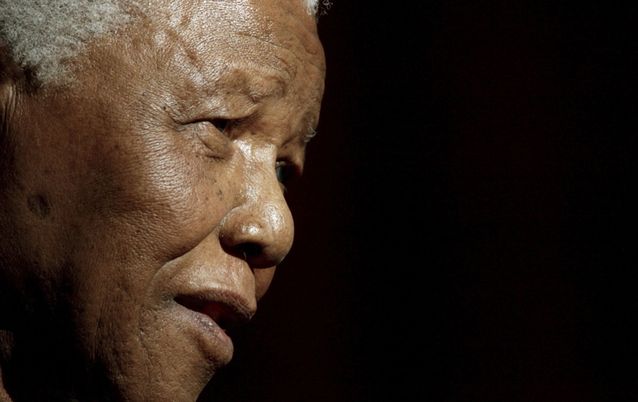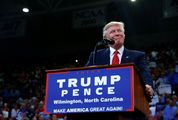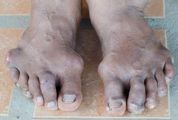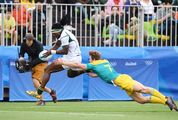HE IS undoubtedly one of the greatest statesmen of the 20th century.
The mammoth task of leading a transition from a country divided by centuries of violence and race into a state that served as an example to others was always going to need a special breed of leader. It found one. His name was Nelson Rolihlahla Mandela, and he is no more.
Though his end was long drawn out and expected, the loss of so colossal a figure still sent a shock through the nation.
In the continent’s history there has not been anyone so universally recognised and admired. His personal stature, unmistakable presence and charisma were the reason the country, firmly planted at the foot of Africa, could extend its influence to the rest of the world. The deft hand with which he led South Africa towards united statehood did not go unnoticed.
Inevitably, the discussion over his legacy shall begin in earnest. Much has already been said and written about him, but such titanic influencers of humanity never cease to be a talking point. The meaning of Mandela is likely to be debated for generations to come.
Like many historical figures before him, Mandela came from humble beginnings. Born on July 18 1918 in the Eastern Cape village of Mvezo, not far from the banks of the Mbashe River, he was destined for leadership, at least on a localised scale. His father, Chief Mphakanyiswa Gadla Mandela, was principal counsellor to the acting king of the AbaThembu, Jongintaba Dalindyebo.
In line with tradition, the young Mandela was expected to fulfil similar responsibilities when he reached maturity. It is fair to assume that the aristocratic environment of his childhood may have contributed to his resistance to oppression. The inherent indignity and disrespect of the colonial system was experienced in the manner in which African leadership was stripped of all power, fuelling resentment among royalty and commoner alike.
Even in his years as a freedom fighter, Mandela always had a regal air about him.
He also possessed the ability to smile readily and this combination contributed enormously to his role as reconciler in the difficult years between his release from prison and the adoption of a new constitution in 1996.
He was nifty in balancing his roles as a party politician and as a stately, somewhat fatherly leader of a young nation coming to terms with the formation of a new society. It was a task few could have mastered, but one he handled with immense grace and aplomb.
His wearing of the Springbok rugby jersey showed his ability to respond perfectly to a mood. That an ANC president could don a Springbok jersey when the team was (and still remains) predominantly white, and at a time when the wounds of racially divided sport were still raw, was unthinkable then.
But the act proved to be the perfect infusion of hope for those who had until then doubted that a nation could be formed.
There are some who say the Mandela narrative was exaggerated for both the African National Congress’s political aims and, later, the need to construct a hero behind whom to unite the nation. There are grains of truth in this.
Decrying the deepening cult of personality around President Jacob Zuma during his quest for the ANC presidency, former president Thabo Mbeki reminded Zuma that only Mandela was the object of deliberate exaltation.
“During the decades we have worked together in the ANC, we have had the great fortune that our movement has consistently repudiated the highly noxious phenomenon of the cult of personality, which we saw manifested in other countries. In this regard there were exceptional circumstances attached to Comrade Nelson Mandela, which were not of his making or will,” said Mbeki.
“In the context of the global struggle for the release of political prisoners in our country, our movement took a deliberate decision to profile Nelson Mandela as the representative personality of these prisoners, and therefore to use his personal political biography, including the persecution of his then wife, Winnie Mandela, dramatically to present to the world and the South African community the brutality of the apartheid system,” he recalled.
Though Mandela’s speech on the day of his release from Pollsmoor Prison, and his appeal for calm after the Boipatong massacre, are memorable, it is probably his little-remembered 1996 statement on the prospect of his own mortality that provides a perspective on how he reckoned with his hero status and inevitable mortality.
Titled “Mandela is but human” and published in the Sunday Times, he said: “The compliment (by the Sunday Times of February 18 1996) is genuinely appreciated, as long as it does not present the president as ‘superhuman’ and create the impression that the ANC — with its thousands of leaders and millions of supporters — is a mere rubber-stamp of my ideas; and that the ministers, experts and others are all insignificant, under the magic spell of a single individual.”
Back then, the prospect of his incapacitation due to ill health, or worse, his passing, generated significant market volatility, a trend that troubled Mandela. He tried to nudge his country into accepting his end.
“Let me restate the obvious: I have long passed my teens; and the distance to my final destination is shorter than the road I have trudged over the years! What nature has decreed should not generate undue insecurity.”
It is nearly 20 years since he uttered those words in a heartfelt plea to the population.
It is a bonus that South Africa continued to revel in his presence. Notwithstanding his appeals, a sense of dread would develop whenever he was admitted to hospital long after he left office. It is a reaction that must have troubled him given his lucid call for everyone to accept the inevitable.
South Africa now has to deal with a profound loss — not just of Mandela’s death, but of the cachet such a person gave this nation.
Perhaps author Stephen Ellis was correct when he said South Africa would be merely average in the post-Mandela era.
“Having, during the course of the struggle, persuaded the world that South Africa was a moral problem for everyone, the ANC has blithely continued since 1994 to suppose that the rest of the world still has special regard for the ANC as the bearer of a moral torch,” he wrote.
“In reality, this has long ceased to be the case. Although Hollywood makes sentimental films about Nelson Mandela, in other respects South Africa does not have a special place in the calculations of foreigners. It’s just another country.”
Therefore, Mandela’s death may give South Africa an opportunity to finally find its true self. The aura of being Mandela’s country acted as a blessing and gave South Africa a claim to being exceptional.
Without him to venerate and pretend he can still pull out a trick or two with his “Madiba magic”, the country might finally learn to stand on its own feet and set about the critical task of nurturing the next generation of potential Mandelas.
Many questions linger. With the country’s population getting younger and the memories of the difficult years of apartheid and its end becoming a distant memory, many are questioning some critical aspects of the Mandela era and legacy. One of these is a proclivity for consensus politics.
In many ways such an approach to politics reflected the fragility of the society. However, as the ANC continued to grapple with increasing inequality and the decline of its historical appeal, it also began to offer a political perspective that marked a departure from Mandela’s. Most notably, whether by default or design, it is increasingly alienated from the racial minorities that coalesced around it at the height of Mandela’s reconciliation effort.
Along with this shift is the reopening of issues considered then as sensitive, such as land ownership and the naked racialisation of politics. While there is a need to speak the truth on race, privilege and economic disadvantage, it is noticeable that the party invokes some of these for political expediency in the face of declining support.
Perhaps such tendencies by the ANC on the one hand, and political demands by opposition parties for a reform of the electoral system on the other, mark a watershed South Africa is yet to appreciate.
The tendency is to look back on Mandela’s tenure with nostalgia, but it was also littered with contradictions. The Truth and Reconciliation Commission was hailed as a model for dealing with conflicts and exported elsewhere, but critics saw it as a free pass for those who wanted to escape responsibility for crimes against humanity.
The downside to being such a huge personality is that Mandela was held personally responsible for collective decisions.
How will history judge him? Very kindly, many will say, but others might have reason to be bitter. In 2013, South Africa is a more resilient place than it was in the 1990s when it often felt as though this nation was skating on the edge of a precipice. Mandela had a lot to do with cultivating that resilience.

Nelson Mandela speaks after being conferred with an honorary doctorate of law at the University of Galway in this June 20 2003 file photo. Picture: REUTERS
HE IS undoubtedly one of the greatest statesmen of the 20th century.
The mammoth task of leading a transition from a country divided by centuries of violence and race into a state that served as an example to others was always going to need a special breed of leader. It found one. His name was Nelson Rolihlahla Mandela, and he is no more.
Though his end was long drawn out and expected, the loss of so colossal a figure still sent a shock through the nation.
In the continent’s history there has not been anyone so universally recognised and admired. His personal stature, unmistakable presence and charisma were the reason the country, firmly planted at the foot of Africa, could extend its influence to the rest of the world. The deft hand with which he led South Africa towards united statehood did not go unnoticed.
Inevitably, the discussion over his legacy shall begin in earnest. Much has already been said and written about him, but such titanic influencers of humanity never cease to be a talking point. The meaning of Mandela is likely to be debated for generations to come.
Like many historical figures before him, Mandela came from humble beginnings. Born on July 18 1918 in the Eastern Cape village of Mvezo, not far from the banks of the Mbashe River, he was destined for leadership, at least on a localised scale. His father, Chief Mphakanyiswa Gadla Mandela, was principal counsellor to the acting king of the AbaThembu, Jongintaba Dalindyebo.
In line with tradition, the young Mandela was expected to fulfil similar responsibilities when he reached maturity. It is fair to assume that the aristocratic environment of his childhood may have contributed to his resistance to oppression. The inherent indignity and disrespect of the colonial system was experienced in the manner in which African leadership was stripped of all power, fuelling resentment among royalty and commoner alike.
Even in his years as a freedom fighter, Mandela always had a regal air about him.
He also possessed the ability to smile readily and this combination contributed enormously to his role as reconciler in the difficult years between his release from prison and the adoption of a new constitution in 1996.
He was nifty in balancing his roles as a party politician and as a stately, somewhat fatherly leader of a young nation coming to terms with the formation of a new society. It was a task few could have mastered, but one he handled with immense grace and aplomb.
His wearing of the Springbok rugby jersey showed his ability to respond perfectly to a mood. That an ANC president could don a Springbok jersey when the team was (and still remains) predominantly white, and at a time when the wounds of racially divided sport were still raw, was unthinkable then.
But the act proved to be the perfect infusion of hope for those who had until then doubted that a nation could be formed.
There are some who say the Mandela narrative was exaggerated for both the African National Congress’s political aims and, later, the need to construct a hero behind whom to unite the nation. There are grains of truth in this.
Decrying the deepening cult of personality around President Jacob Zuma during his quest for the ANC presidency, former president Thabo Mbeki reminded Zuma that only Mandela was the object of deliberate exaltation.
“During the decades we have worked together in the ANC, we have had the great fortune that our movement has consistently repudiated the highly noxious phenomenon of the cult of personality, which we saw manifested in other countries. In this regard there were exceptional circumstances attached to Comrade Nelson Mandela, which were not of his making or will,” said Mbeki.
“In the context of the global struggle for the release of political prisoners in our country, our movement took a deliberate decision to profile Nelson Mandela as the representative personality of these prisoners, and therefore to use his personal political biography, including the persecution of his then wife, Winnie Mandela, dramatically to present to the world and the South African community the brutality of the apartheid system,” he recalled.
Though Mandela’s speech on the day of his release from Pollsmoor Prison, and his appeal for calm after the Boipatong massacre, are memorable, it is probably his little-remembered 1996 statement on the prospect of his own mortality that provides a perspective on how he reckoned with his hero status and inevitable mortality.
Titled “Mandela is but human” and published in the Sunday Times, he said: “The compliment (by the Sunday Times of February 18 1996) is genuinely appreciated, as long as it does not present the president as ‘superhuman’ and create the impression that the ANC — with its thousands of leaders and millions of supporters — is a mere rubber-stamp of my ideas; and that the ministers, experts and others are all insignificant, under the magic spell of a single individual.”
Back then, the prospect of his incapacitation due to ill health, or worse, his passing, generated significant market volatility, a trend that troubled Mandela. He tried to nudge his country into accepting his end.
“Let me restate the obvious: I have long passed my teens; and the distance to my final destination is shorter than the road I have trudged over the years! What nature has decreed should not generate undue insecurity.”
It is nearly 20 years since he uttered those words in a heartfelt plea to the population.
It is a bonus that South Africa continued to revel in his presence. Notwithstanding his appeals, a sense of dread would develop whenever he was admitted to hospital long after he left office. It is a reaction that must have troubled him given his lucid call for everyone to accept the inevitable.
South Africa now has to deal with a profound loss — not just of Mandela’s death, but of the cachet such a person gave this nation.
Perhaps author Stephen Ellis was correct when he said South Africa would be merely average in the post-Mandela era.
“Having, during the course of the struggle, persuaded the world that South Africa was a moral problem for everyone, the ANC has blithely continued since 1994 to suppose that the rest of the world still has special regard for the ANC as the bearer of a moral torch,” he wrote.
“In reality, this has long ceased to be the case. Although Hollywood makes sentimental films about Nelson Mandela, in other respects South Africa does not have a special place in the calculations of foreigners. It’s just another country.”
Therefore, Mandela’s death may give South Africa an opportunity to finally find its true self. The aura of being Mandela’s country acted as a blessing and gave South Africa a claim to being exceptional.
Without him to venerate and pretend he can still pull out a trick or two with his “Madiba magic”, the country might finally learn to stand on its own feet and set about the critical task of nurturing the next generation of potential Mandelas.
Many questions linger. With the country’s population getting younger and the memories of the difficult years of apartheid and its end becoming a distant memory, many are questioning some critical aspects of the Mandela era and legacy. One of these is a proclivity for consensus politics.
In many ways such an approach to politics reflected the fragility of the society. However, as the ANC continued to grapple with increasing inequality and the decline of its historical appeal, it also began to offer a political perspective that marked a departure from Mandela’s. Most notably, whether by default or design, it is increasingly alienated from the racial minorities that coalesced around it at the height of Mandela’s reconciliation effort.
Along with this shift is the reopening of issues considered then as sensitive, such as land ownership and the naked racialisation of politics. While there is a need to speak the truth on race, privilege and economic disadvantage, it is noticeable that the party invokes some of these for political expediency in the face of declining support.
Perhaps such tendencies by the ANC on the one hand, and political demands by opposition parties for a reform of the electoral system on the other, mark a watershed South Africa is yet to appreciate.
The tendency is to look back on Mandela’s tenure with nostalgia, but it was also littered with contradictions. The Truth and Reconciliation Commission was hailed as a model for dealing with conflicts and exported elsewhere, but critics saw it as a free pass for those who wanted to escape responsibility for crimes against humanity.
The downside to being such a huge personality is that Mandela was held personally responsible for collective decisions.
How will history judge him? Very kindly, many will say, but others might have reason to be bitter. In 2013, South Africa is a more resilient place than it was in the 1990s when it often felt as though this nation was skating on the edge of a precipice. Mandela had a lot to do with cultivating that resilience.












 News and views on the death, and life, of former president Nelson Mandela
News and views on the death, and life, of former president Nelson Mandela










